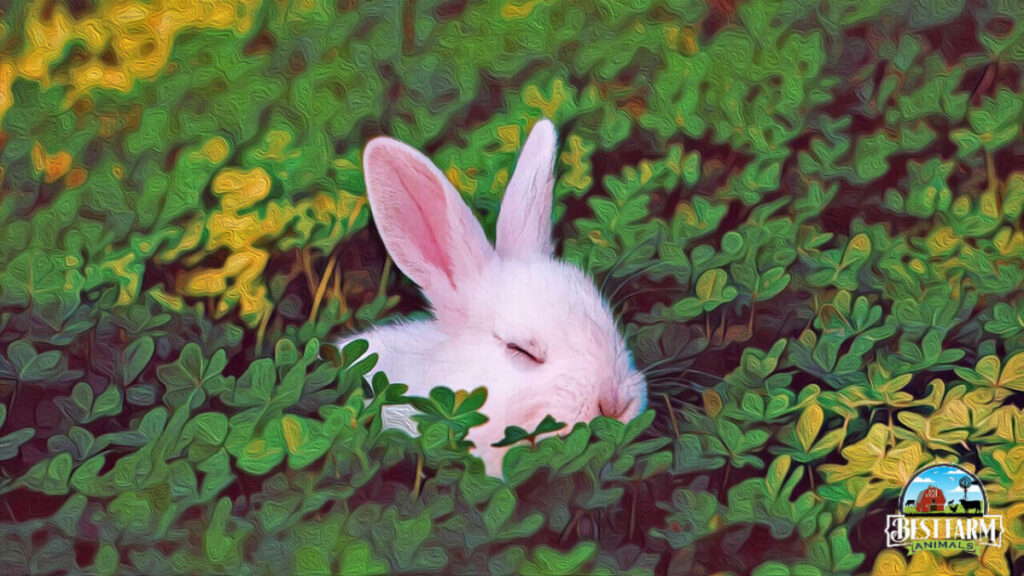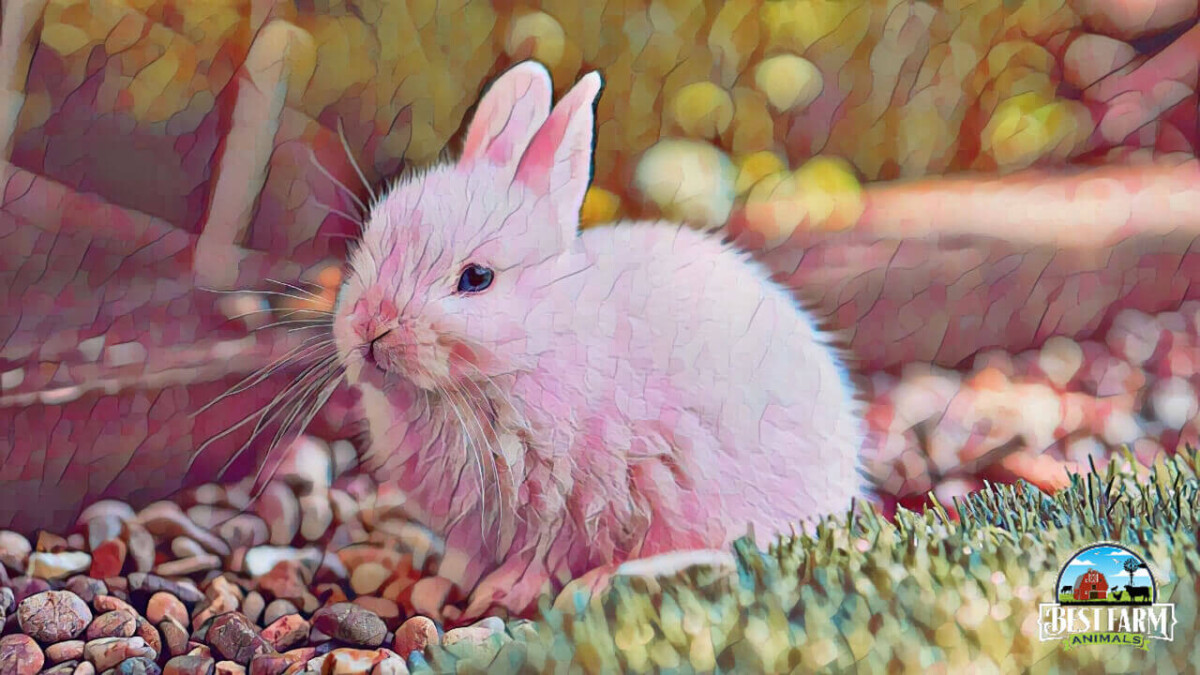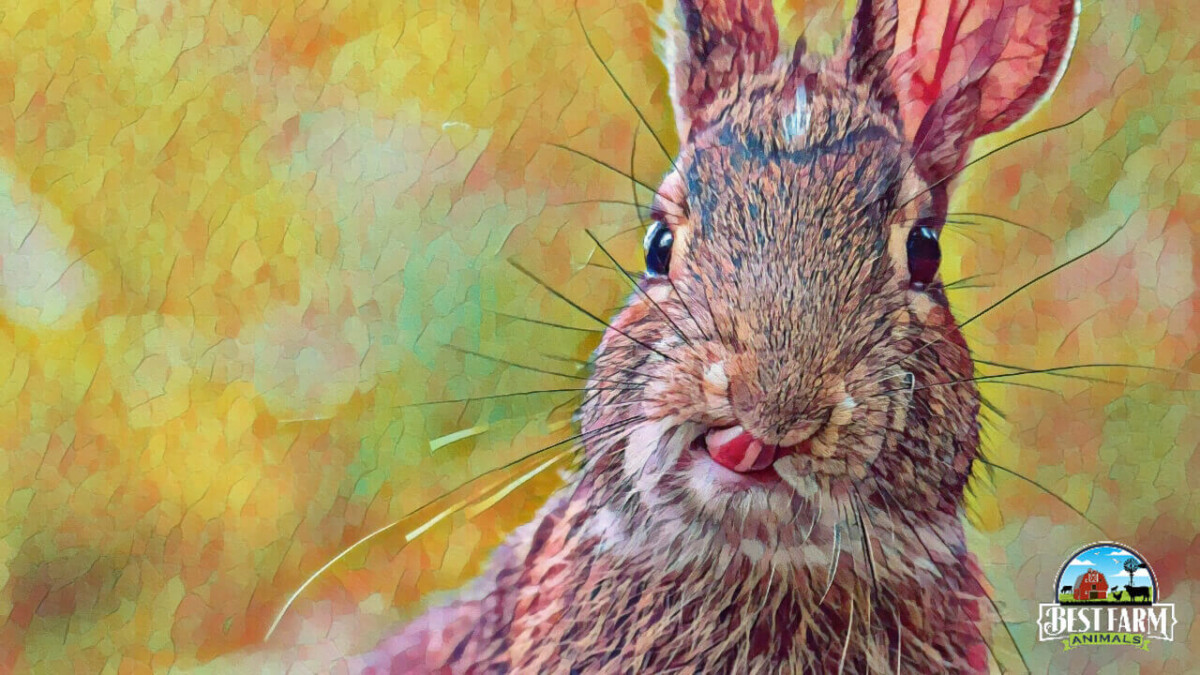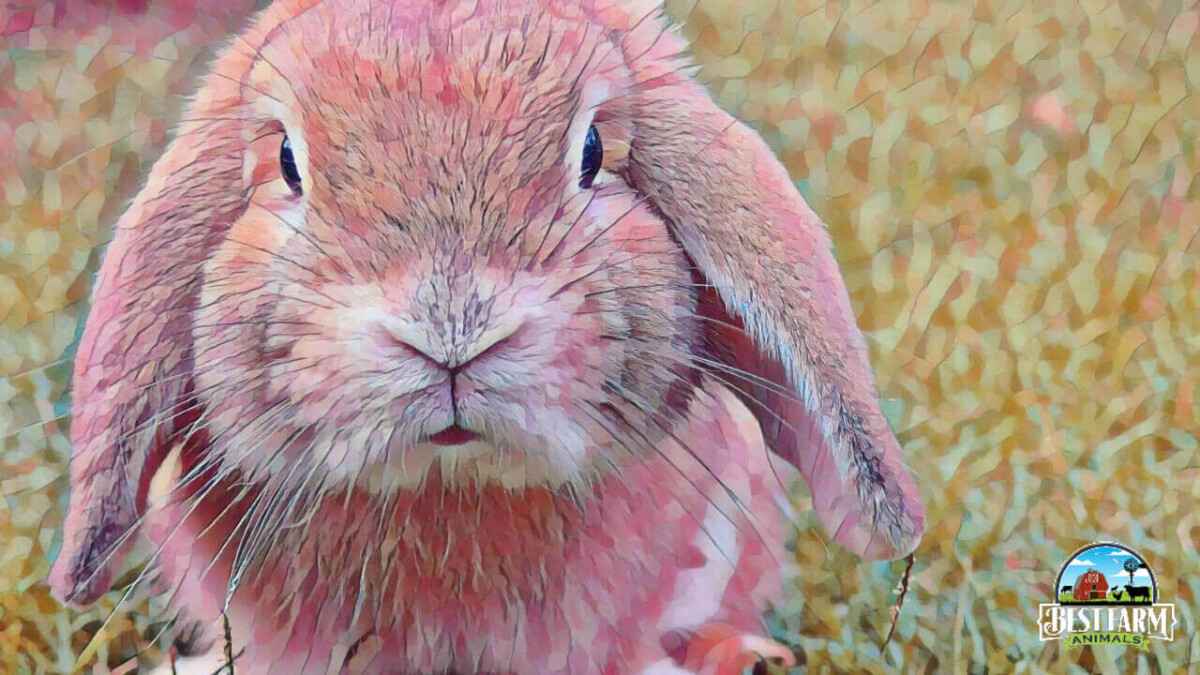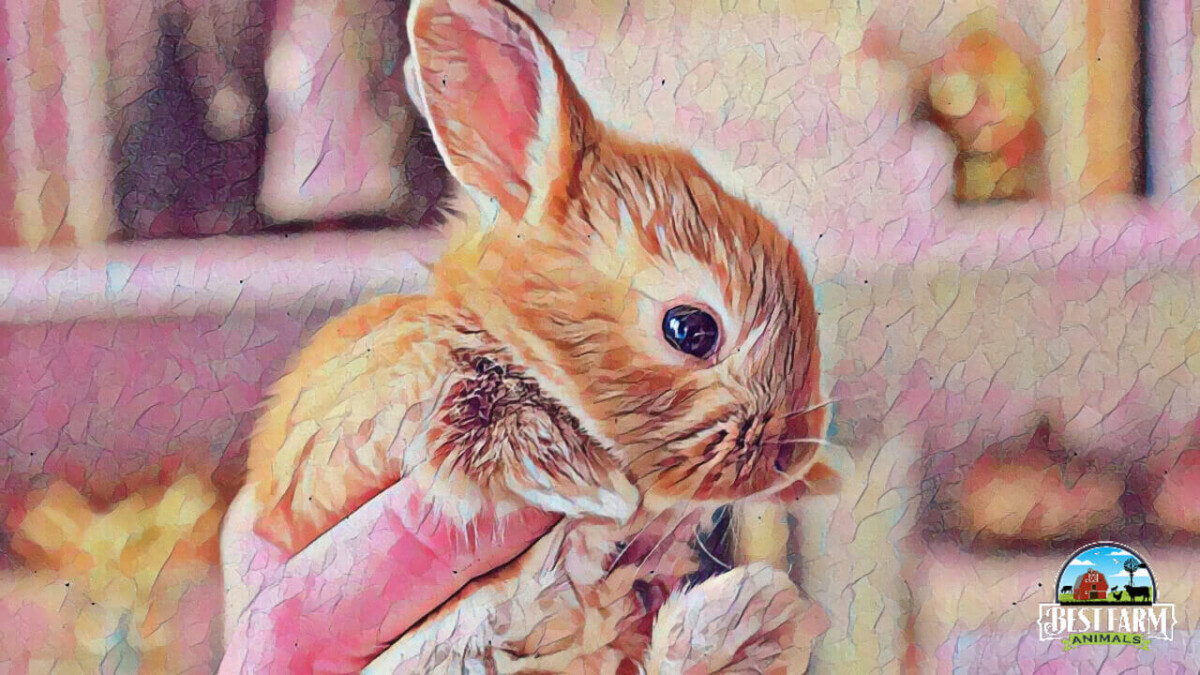Life with our new bunny has been fascinating. He has the strangest behavior.
When we first brought Ponyo to our homestead, we didn’t realize just what a little character he was. My son enjoys sitting on the lawn with Ponyo and teaching him tricks. Recently, our bun started circling my son and rubbing his chin against his knee. Ponyo would often flop down onto the grass and stare at him for the longest time.
So why does your rabbit stare at you? Rabbits stare at you for numerous reasons. The most common reasons are begging for food or warming up to a new person or environment. Sometimes a rabbit will stare at you simply out of love and affection. Your rabbit might not be staring at you at all, and they’re fast asleep (rabbits sleep with their eyes open). Another reason rabbits stare at you is that they’re experiencing pain or ill. In this case, you’ll need to get them to a vet as soon as possible.
Bunny behaviors are pretty new to our family, and we were a little concerned that Ponyo’s behavior might be leaning toward the aggressive side. So, to ensure we responded correctly to this new behavior, I contacted the vet to determine if the staring was natural or the start of an aggressive habit.
Reasons Why Your Rabbit Stares at You
Rabbits certainly have some weird and wonderful habits. Staring is probably one of a rabbit’s most common behaviors and can mean very different things depending on their body language.
Love and Affection
Have you ever experienced that feeling of someone staring at you? And suddenly, you get that warm and fuzzy feeling? Well, that’s how it feels when a rabbit stares at you lovingly. By reading your buns’ body language, you’ll quickly pick up that this is a loving and happy gaze.
Your bun will be totally relaxed, lying on their side with their legs tucked closely under their body. This behavior shows that they feel at ease and are not concerned about any threats. A rabbit will spend a lot of time gazing at you like this.
Did you know? Bonded rabbits (domestic and wild) often spend hours gazing at one another lovingly?
Experiencing Illness or Pain
Bunnies are capable of staring at nothing for long periods. However, if your bun has stopped doing any of their everyday activities and is just staring at a wall, it’s worthy of concern.
In general, if a rabbit stares at a wall, they may be ill or experiencing pain. Rabbits are great at hiding pain or illness to avoid looking weak to predators. By turning their back on you and facing a wall, they are trying to avoid contact with you.
Watch out for the following signs if you suspect your bun may be ill or in pain:
- Obvious lethargy
- Sitting in a hunched position
- Loss of appetite
- Diarrhea
- Growling or grunting at you if you get too close
If your bun displays any of these symptoms, you must take them to the vet for treatment.
Did you know: that a rabbit’s eyes are located on the sides of their heads? So when they’re staring at the wall, they’re staring at either side of them.
Getting Used to Their Surroundings
Bringing a bunny to your home for the first time can be interesting. At first, your bun may huddle in a corner and stare at you. They’re still weary of you and their new surroundings. They may continue to stare at you until they feel content and satisfied that the environment is safe.
Strange sounds and smells can also cause them to sit upright and stare (sometimes for long periods). Once your bun has established that you aren’t a predator (or a threat), they should relax and approach you.
They’re Sleeping
Your floppy-eared friend might not be staring at you, and they may actually be catching a quick nap or fully asleep. These amazing prey animals sleep with their eyes open to protect them from predators.
A rabbit has a nictitating membrane (inner eyelid) that allows them to “sleep” with their eyes wide open. The membrane keeps the rabbit’s eyes lubricated while they sleep, and their brains can still receive information from their eyes.
If a predator approaches, the rabbit can react immediately without getting caught off guard. Even domestic rabbits have this survival instinct. Here are some signs that your bun is sleeping:
- Sitting upright causes their body to appear puffed out.
- Ears fold down against their head.
- Lying on their stomach with their legs out behind them or to the side.
- Shallow breathing.
Begging for Food
Just like dogs, rabbits are very good at begging for food. They do this by staring at you, especially if you have a tasty fruit or vegetable in your hand. If you don’t give them what they want, your bun will place their front paws on your leg or against their enclosure.
If this still doesn’t work, they may resort to nipping you to get your attention. Rabbits are capable of getting very hangry (hungry and angry). Once your bun has the treat or food, they’ll hop away, and the staring will stop.
8 Rabbit Behaviors Explained
Your floppy-eared friend has so many cute and funny behaviors that can be very entertaining. Some of their behaviors can be pretty strange too. Understanding your bun’s behavior can help you understand and respond to them.
1. Keeps Running Away From You
If your rabbit keeps running away from you, this typically means that they feel afraid or irritable. If you continuously try to pick up your bun, you may find that they automatically run away from you when you approach them.
A rabbit will also run away if they feel cornered or don’t want to return to their enclosure. Perhaps your bun is mad at you for not giving them a treat or petting them. Your bun could also be playful and want to interact with you.
Approaching your bun in a rush or talking loudly will also scare them away. Your rabbits’ survival instincts will kick in, and their goal will be to get away from the danger (which, in this instance, might be you) as quickly as possible.
How to Respond:
Remember, running is a rabbit’s natural reaction to a “threat.” You must respect your bunny and approach them slowly and quietly until they’re used to you. Get your bunny to trust you by offering treats and showering them affectionately.
Instead of picking your bun up, sit on the floor and pet them gently or give them a relaxing massage. Try to avoid making any loud sounds when handling your rabbit.
2. Growls at You
A growling rabbit can be quite unexpected and a bit scary. If your bun feels threatened or feels like they’re trapped, they will growl at you as a warning. This growling can also be followed by hissing, grunting, and lunging at you, which are all signs of anger and disapproval.
Growling shows that your bun wants you to leave them alone, stop trying to pick them up, and doesn’t want you in their space. Rabbits will also growl at other rabbits as a warning.
A few reasons why your rabbit might growl at you are:
- You’re in their space
- You accidentally stood on their toes or tail
- You’re chasing them around, and they don’t like it
- Protecting their kits (babies)
How to Respond:
Your bun growling at you is a warning, so the best way to respond is by backing off and allowing your rabbit to calm down. Spend time with your rabbit and interact as much as possible to gain their trust.
If your bun feels threatened, move slowly around them and talk with a soothing and calm tone. Growling is a natural behavior, but it can also be harmful to your bun if they get too worked up.
A rabbit can become so riled up that they have a heart attack. Again, respect your rabbits’ boundaries and try to approach them again a little later.
3. Pushes You With Their Head
When your bun pushes or nudges you with their head, it’s their way of saying “hello.” Think of it as a handshake between two people. Another reason a rabbit nudges you with their head is that they want you to pet them or give them a tasty treat.
Nudging one another is a natural behavior for rabbits.
How to Respond:
Your response will depend on why your bun is nudging you. Try petting them or massaging them. If they lie down and close their eyes, you are doing what they want. If this doesn’t work, give them a treat.
Sometimes your rabbit might nudge you because you are in the way of something. Move away and see if they move on. If they nudge you again, then try giving them some more attention.
4. Licking Your Hands and Face
Rabbits groom themselves and other rabbits by licking one another. Licking is a natural behavior that demonstrates affection. If your floppy-eared friend has taken to licking and grooming you, this means they care about your well-being and bonding with you.
Bunnies groom countless times a day, so don’t be surprised if your bun grooms you as often as they can. Your bun will also show affection by:
- Following you around
- Climbing all over you
- Binkying (jumping and twirling) near you
How to Respond:
If you don’t mind your bun grooming you, you should sit back and enjoy the loving attention. Your bun also finds the act of grooming calming.
Your rabbit is trying to form a bond with you, so it’s best to reciprocate by allowing them to groom you for a while. You could also thank them by petting them or giving them a gentle massage in return.
Rabbits will also lick you to try and get your attention. Stop what you’re doing and acknowledge them. Your bun will love you for it.
5. Circling You and Honking
This behavior can be amusing, especially if your bun starts honking. A rabbit naturally circles another rabbit when they want to mate. This courting behavior precedes a honking sound which sounds like a soft version of a pig’s oink.
They might turn their affections towards you if you only have one bunny. When a rabbit honks, it can also mean they’re excited, looking for attention, want to mate, or are just really happy to see you.
Rabbits can be cheeky and become frustrated if you don’t react to their “advances.” They may nip you to get your attention.
How to Respond:
Watch your buns’ body language so that you can respond accordingly to this natural display of affection. Pet your bunny, or give them a treat. This should stop the circling. If they eat the treat and continue circling you, this can mean that they are in a playful mood.
Consider adopting another bunny if you suspect your rabbit is bored or lonely. If your bun suddenly spritzes you with urine, it indicates that they are claiming you as their own. This behavior can become a bad habit.
The best way to stop this behavior is by having your bun spayed or neutered.
6. “Chinning” Objects
If your new rabbit starts “chinning” (rubbing their chin against objects like your furniture or you), this is a great sign. Chinning means that your bun feels at home, and it’s their way of marking things as theirs.
Rabbits have a small gland under their chin that releases a hormone when they rub it against something. Don’t worry; human noses are unable to pick up the scent. However, if you have another rabbit, they’ll pick up on the scent and steer clear of the marked area.
If there is competition between the two bunnies, you may notice them “chinning” the same spot to claim it.
How to Respond:
Your bunny “chinning” you is one of the highest compliments, and you should feel very honored. Your bun feels that you’re very special to them. Luckily, when a rabbit chins you, they don’t leave a scent like a dog (dogs pee on things to mark them).
If you have multiple rabbits, they may fight for dominance over an object. Keep an eye on your rabbits to ensure no jealousy or territorial fighting between your bunnies can cause harm. Split them up for a short period, and try putting them together again.
7. Eating Their Poop
Rabbits eat their poop, which might seem very strange for new bunny owners. However, this is a perfectly natural behavior for rabbits. Your bun will eat cecotropes (nutrient-dense droppings) which are pretty different from the regular coco-puff-like poop balls they usually produce.
Cecotropes or “night feces” are soft poop balls covered in sticky and shiny mucus. They do have a much more pungent odor and are often clumped together like a bunch of grapes. Your bun eats these sticky poop balls to ingest good bacteria and nutrients (think of it like recycling nutrients).
How to Respond:
Usually, you won’t see your bun eating their cecotropes as they produce them in the early morning hours (and they eat them directly from their anus). If you notice cecotropes in their living environment, this could indicate that they’re producing too many.
If a rabbit produces too many cecotropes, it means there’s too much sugar in their diet, or they’re stressed. Monitor your bun, and take them to the vet for a check-up.
8. Grinding Their Teeth
Have you ever stroked your buns head and heard a soft clicking-grinding noise? This sound is your bun’s way of saying they’re enjoying the attention. A rabbit grinding their teeth is similar to a cat purring.
You’ll also be able to feel the vibrations from their teeth rubbing together. If your bun is making a loud crunching noise with their teeth, this can be a sign that your rabbit is in pain. Your bun will show the following symptoms if they’re in pain:
- Whimpering
- Hunched over
- Ears flat against their head
How to Respond:
If your bun is relaxed and calm when they grind their teeth, continue doing what you’re doing as it’s working. If your bun’s body language is tense, and the grinding noise is loud, you may need to take your rabbit to the vet as they may be in pain.
In Conclusion
Our vet suggested we bring Ponyo in for a check-up to ensure everything was okay with him. Thankfully Ponyo is a healthy young buck (male rabbit), and there was no cause for alarm.
It turns out that Ponyo was staring at our son out of love and affection. The circling behavior is also Ponyo’s way of looking for attention. However, because he was also honking while circling, this can indicate that Ponyo has sexually matured and is displaying courting behavior.
The vet advised that we wait until our bun is six months old so that he can be neutered, and this behavior should stop. When it comes to bunny behaviors, it’s vital to ensure that you pay attention to your rabbit’s body language, which will help you respond correctly.
Recommended Rabbit Supplies
This list contains affiliate products. Affiliate products do not cost more but helps to support BestFarmAnimals and our goal to provide farm animal owners with accurate and helpful information.
Housing: If your rabbit is indoor, you’ll need a cage, a hideout (to keep your rabbit from death by heart attack), and a space for it to get exercise and spend time with you. If you don’t want to let it run free in your house, this animal playpen provides space and keeps your rabbit from hiding under your couch.
If you keep your rabbit outdoors, an outdoor hutch that provides space and protection from predators is needed. (I’d still keep mine in a barn for further protection from the elements.)
You’ll also need bedding, toys, a grooming brush, and treats for your little friend. A litter box is important because rabbits can be potty trained. Timothy hay is the best kind of hay for rabbits as alfalfa is too sweet. Don’t forget a water drinker. I like the half-gallon waterer because it can cover two rabbits for several days. Pair it with a food bowl or a food manger (a little cleaner) and you’ll be set up!
If you want to treat your bunny to entertainment, a cat tower, a treat ball, or bunny toys all work wonderfully.
Finally, if you plan on taking your rabbit with you on trips, you’ll need a carrier. Here’s a small carrier or larger carrier that work great for occasional travel. If you travel a lot, you might want the carrier that’s rated #1 in safety for safe travels
Lastly, I use this odor eliminator for accidents and to wipe out the bottom of the cage and litter box when I clean it.

